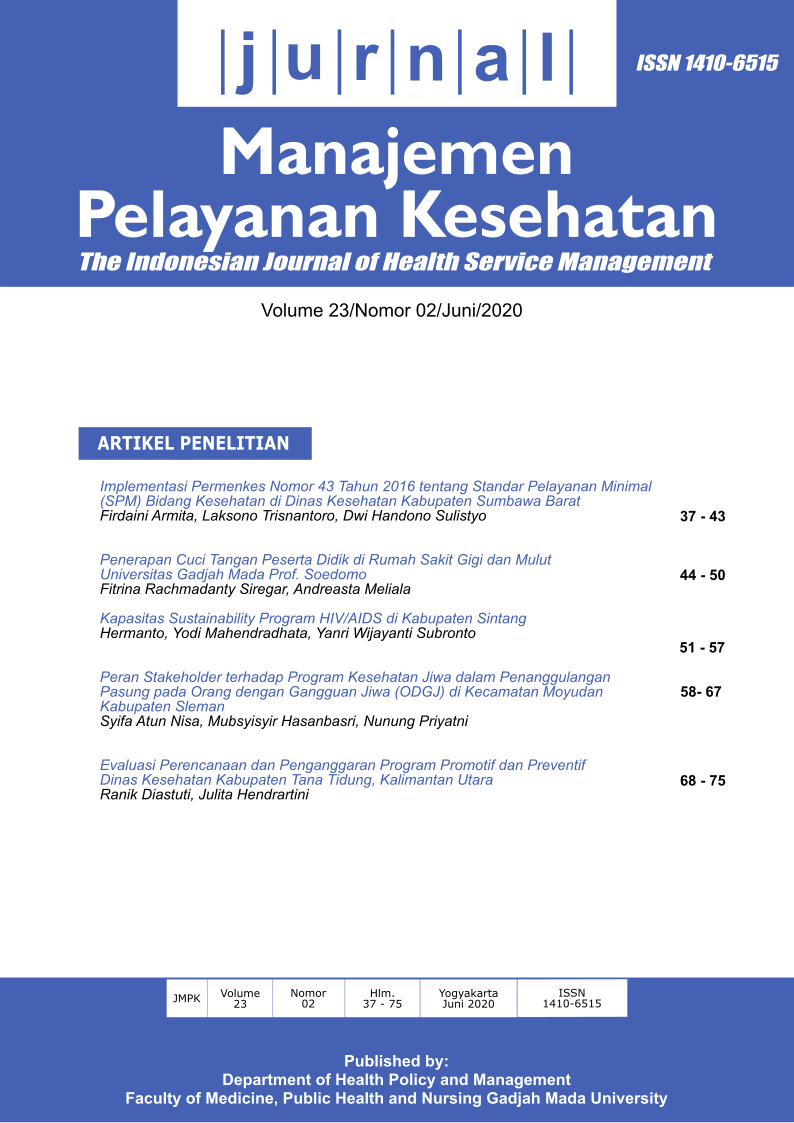IMPLEMENTASI PERMENKES NOMOR 43 TAHUN 2016 TENTANG STANDAR PELAYANAN MINIMAL (SPM) BIDANG KESEHATAN DI DINAS KESEHATAN KABUPATEN SUMBAWA BARAT
IMPLEMENTATION OF PERMENKES NUMBER 43 OF 2016 ABOUT MINIMUM SERVICE STANDARDS HEALTH SECTOR AT THE HEALTH OFFICE WEST SUMBAWA DISTRICT
Abstract
Background: Ministry of Health has issued Regulation the Minister of Health No. 43 of 2016 about Minimum Service Standards (SPM) Health Sector. This SPM contains 12 types of basic services which targeting 100% by the District / City Government. According to SPM report District West Sumbawa at 2017, they must more focused in three achievements indicator, among them mental disorders (ODGJ) weight (129.92%), pregnancy care (83.02%) and
Tuberculosis care (TB) (28.26%). District West Sumbawa has not declared regulation about the implementation SPM in health sector become Regent Regulation because of constraints in determining indicator objectives.
Objective: To describe the acceptance Health District in implemen tation Permenkes No. 43 of 2016 about SPM in West Sumbawa Regency.
Methods: This research was qualitative research with descriptive research and using implementation research. Collecting data by in-depth interviews and document review.
Results: The acceptance Health District West Sumbawa in implementation Permenkes No. 43 of 2016 to three SPM indicators, resulted that: (1) has accepted in affective attitude component; (2) has not accepted in burden components; (3) only TB indicator has accepted in ethicality component; (4) only TB indicator has not
accepted in intervention coherence; (5) only ODGJ indicators has accepted in opportunity costs component; (6) has accepted in perceived effectiveness component; (7) has accepted in self-efficacy component.
Conclusion: Factors inhibiting acceptance implementation Permenkes No. 43 of 2016 in burden component were unavailability of regional regulation regarding SPM and dominant budgeting from
APBN. Then in ethicality component there was an incompatibility between ODGJ and pregnancy indicator with local government performance indicator. Lack of training in TB care became a factor inhibition in intervention coherence. Then in opportunity costs component, there was inadequate innovation of pregnancy and TB
indicator. We need attention from various sectors to improve SPM policy implementation.
Copyright (c) 2020 Firdaini Armita, Laksono Trisnantoro, Dwi Handono Sulistyo

This work is licensed under a Creative Commons Attribution-NonCommercial-ShareAlike 4.0 International License.




